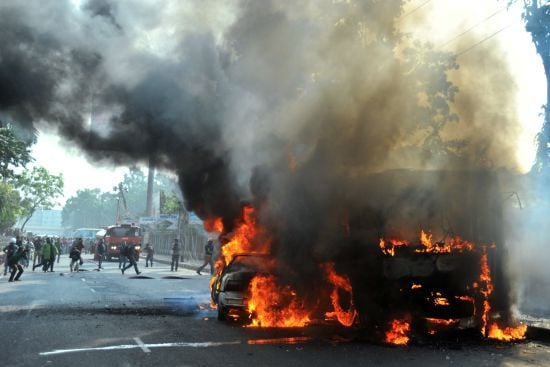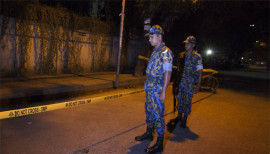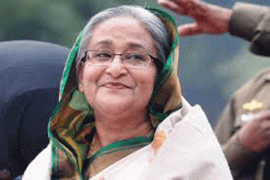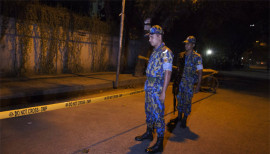
While experts are dubious about the Islamic State organisation's claim of responsibility for the latest killings, they say hardliners who have been shut out of the political mainstream are opting for increasingly desperate measures in a country known for its religious tolerance.
The latest killings follow the assassination of four atheist bloggers since the turn of the year, undermining the government's efforts to play down the threat posed by hardliners.
Even before Saturday's murder of Japanese national Hoshi Kunio in the northern town of Kaunia, Australia had cancelled a tour of the cricket-mad nation over security fears.
The killings of Kunio and Italian aid worker Cesare Tavella last Monday have also prompted buyers from foreign garment companies to shelve a meeting with local manufacturers due to have taken place in Dhaka in a worrying development for the $25 billion industry.
"These killings are very ominous signs. There is a pattern that these are done by militants, which makes everyone concerned," Ali Riaz, an expert on militancy in Bangladesh based at Illinois State University, told AFP by phone.
"The future of Bangladesh is at stake because if these killings are continued it'll have a ripple effect on the country's political stability and its economy."
Only this year Bangladesh officially joined the club of low to middle income economies, shedding its status as a least developed nation, after posting annual growth rates of around six per cent over the last decade.
Scores of opposition activists have gone missing since the start of the year when the latest round of anti-government protests erupted, with families fearing they have either been secretly detained or killed.
Veteran political analyst Ataur Rahman said the crackdown on radicals had only served to fuel militancy.
"There is no doubt that a big section of the people are aggrieved. Some political groups are so cornered that they may have opted for desperate measures," Rahman told AFP.
The hitherto unheard of Ansarullah Bangla Team has claimed responsibility for three of the blogger killings while Islamic State has put out statements claiming both of last week's assassinations — the first time that the group has been linked to any such killings in Bangladesh.
Prime Minister Sheikh Hasina has said police have no evidence to confirm the militant group's involvement while her interior minister has repeatedly said there is no IS presence in the country.
But police have in fact trumpeted several arrests in recent months of alleged IS recruiters or would-be combatants said to have been planning to head to Iraq or Syria.
Abdur Rob, a professor of political science at Dhaka's private North South University, said he was dubious about IS's claim of involvement.
"The militants are here and their numbers are growing," he told AFP. "But IS has yet to find a toe-hold. The foreigners' killings don't have any IS signatures," he said.
Riaz said he would "agree with those who doubt the presence of IS in the country" but said that the recent crackdowns had "created an environment which now appeals to the militants".
"The more you see the democratic space is shrinking, the more likelihood that militant groups will proliferate," he added.






















1713904359-0/burn-(1)1713904359-0-270x192.webp)












1713853507-0/MalalaHilary-(2)1713853507-0-270x192.webp)







COMMENTS
Comments are moderated and generally will be posted if they are on-topic and not abusive.
For more information, please see our Comments FAQ